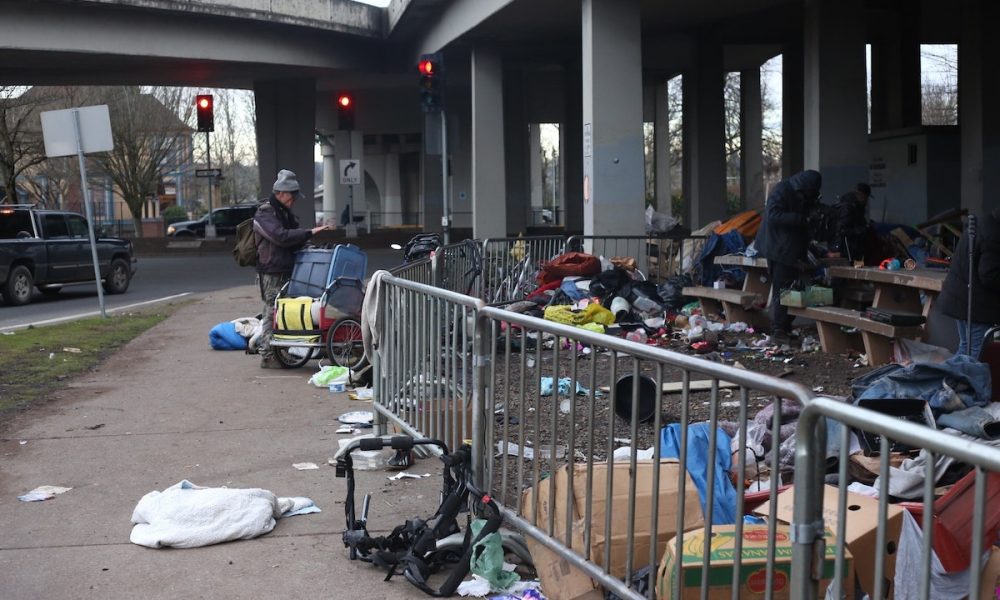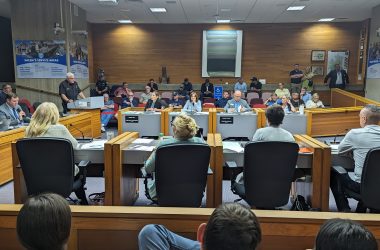
A proposal to make it illegal for people to sit or lie on Salem sidewalks during the day won’t go before Salem City Council on Monday.
City officials said Thursday that the proposal, which aims to curtail a purported rise in disturbances caused by homeless people, was postponed at the request of Councilor Tom Andersen, who will be out-of-town that night.
“It’s at Councilor Andersen’s request. He’s not going to be there at the July 22 meeting,” said Kenny Larson, a city spokesman.
Larson said a public hearing for the ordinance hasn’t been rescheduled.
Andersen could not be reached for comment Thursday morning.
Keep local news going – subscribe to Salem Reporter.
Salem Reporter first reported last week about the ordinance, which city officials describe as a tool for the city to address tensions between homeless people and the general public – particularly business owners downtown.
Dubbed the “Sidewalks and Public Space Ordinance,” it would ban sleeping or lying on sidewalks and other public rights-of-way from 7 a.m. to 9 p.m. It would also ban tents and other makeshift structures from sidewalks at all hours. And it would ban people from leaving property unattended for more than 24 hours.
A first violation leads to a warning. A second violation leads to expulsion from the area, although people expelled can use day centers at local shelters. A third violation can lead to a charge of criminal trespass. City officials told Salem Reporter the proposal is deliberate to not arrest people immediately.
“It does not start with an arrest,” said Urban Development Director Kristin Retherford last week. “There are basically a few different levels where it can escalate and where it would be criminal.”
Some reasons to sit are excepted from the ordinance, like using a wheelchair, shopping at nearby businesses or sitting in case of a medical emergency.
The new rules would encompass the entire city — not just downtown. Sleeping or lying on sidewalks is also permitted outside of the restricted hours.
Retherford said Thursday that city employees don’t currently have any demonstrable evidence that there is a rise in problems related to homelessness. She said that, anecdotally, police say there are more calls and residents are reaching out more often to the city and to elected officials.
“I’m sure we could go back and catalog all of that,” she said.
The city of Salem tried to pass a similar ordinance in September 2017, but council rejected it after residents said the proposal was unconstitutional, according to archived news reports.
Concerns are already emerging for that the new ordinance could hatch other problems.
To shoo homeless people away from downtown could steer them into residential neighborhoods or other homeless camps, said one homeless services provider.
“They may be out-of-sight there, but it’s probable they will be more in danger, too,” said Jimmy Jones, executive director of the Mid-Willamette Valley Community Action Agency.
Jones also told Salem Reporter he worried homeless people with disabilities would have to move long distances if excluded from an area.
However, Jones said his organization is neither supporting nor opposing the ordinance.
“Our moral imperative is to serve the poor, end poverty and homelessness, and promote human dignity,” he said. “When issues like this ordinance come up, we do our best to inform the public and elected officials about the consequences of public policy choices.”
Have a tip? Contact reporter Troy Brynelson at 503-575-9930, [email protected] or @TroyWB.









